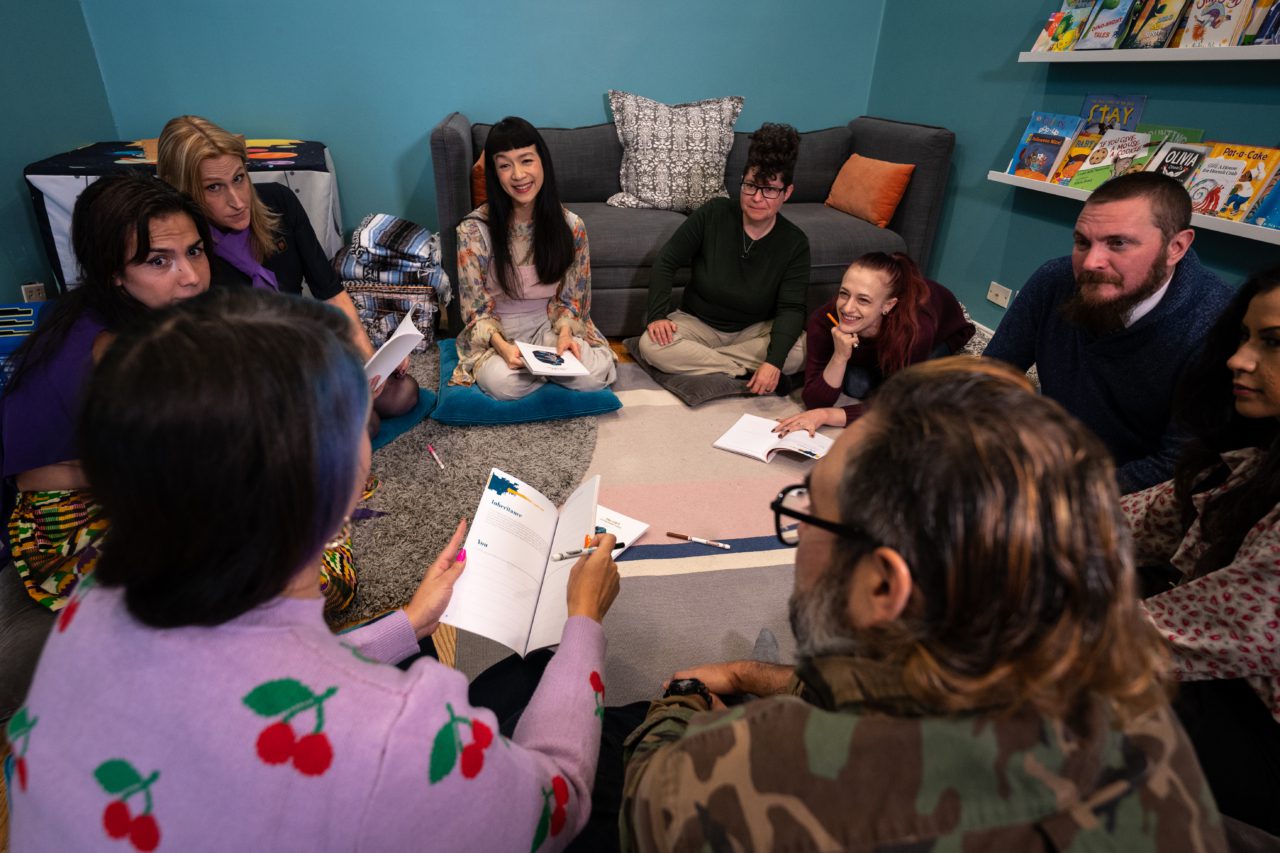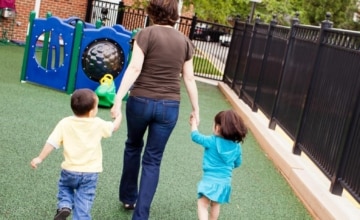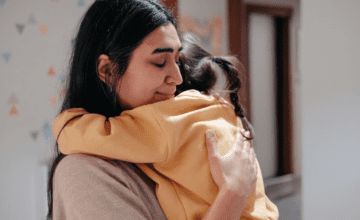1. What is the burning question(s) that has led you to the work you are doing now? The “what if’s” that keep me tossing and turning in bed at 4:36 AM are:
- What if “family healing” went beyond reducing trauma symptoms in the parent-child dyad and expanded to include both intergenerational family healing and collective, societal liberation?
- What if all our parents and grandparents re-parented themselves and gave themselves what their inner children needed to feel safe, protected, loved, and understood? How would they embody self-love? How would they show up wholeheartedly for themselves and their children amid racism, capitalism, individualism, and colonialism?
- What if our culture valued care and connection among ourselves, our land, and our ancestors over currency? These questions guide me back to the heart of my work, which is for caregivers and children to be loved and understood for all of who they are in their homes and on the streets, in their communities.
As you have already noticed, my wonderings are at the intersection between family wellness and social justice. They make for really fun dinner table conversations for an introvert like me. However, these rich and nuanced questions started with Dr. Brazelton’s infamous two questions that parents often ask themselves: “Am I okay as a parent?” and “Is my baby okay?” I am deeply grateful for his insights that nurtured my curiosity as a new home visitor over a decade ago. Finding a caregiver’s passion for their baby, even though that passion is underneath the caregiver’s anger, anxiety, and other defense mechanisms, was and still is my jam. It is such an honor to witness a caregiver’s full humanity.
I know you know what I am talking about. It is those moments when a mother is struggling to position her newborn for feeding. The baby’s hunger intensifies and they cry louder and louder. The mother, driven by uncertainty, anxiety, and fear of judgment from you (the well-meaning, smiley, home visitor), is shuffling the crying baby to find the just-right position. Your anxiety might be rising too: “Do I intervene and ‘coach’ this mom? Or do I shut up and let her emerging capacity blossom?” After 5 minutes of trial and error that feels like 5 hours, the mother and the baby meet each other in that just-right feeding position. As they delight in each other, you hold that space for awe and wonder to unfold.
Brazelton’s questions got me working hard integrating child development, family systems, and infant-family mental health into my home visiting work. But as I practiced, I came to see that many of the issues that affected the families I was working with didn’t show up in the answers to those questions. So I started to deepen and expand my practice by asking “So what?” and “What else?”
“This mom and baby are attuned to each other. I’m doing all the juicy clinical things: family-centered and strength-based cultural humility; play-based, brain-based coaching. I even had kale for lunch before talking to her about postpartum depression…. So what? What am I going to do when this dyad walks outside their home to face a food desert and job insecurity in their neighborhood due to redlining? Or microaggressions in their workplace and police brutality in their community? Hmm, what else can I do?”
Asking “So what?” and “What else?” reminds me to think about what my practice would look like if I centered equity in the heart of family-child relationship and child development. “So what? What am I going to do when the baby’s cry reminds this mother of her own attachment injury? Hmm, what else can I do… when her meaning making of the baby’s cry is ‘I don’t have control over my own body and this baby is going to intrude upon my boundaries (again)’?”
No matter the reason I work with families, I almost always end up finding myself and the families doing the “hard and heart work” of metabolizing intergenerational family trauma and unsubscribing from internalized oppression together. In solidarity, we are on a journey to healing as we come back home to our bodies and come back to care.
2. What message or advice would you like to share to those who aspire to be make a difference, and perhaps become emerging leader themselves, in the field of IECMH, particularly in light of the challenges you see?
I wholeheartedly believe that the most immediate challenge facing IECMH professionals is the way we wear ourselves down overdelivering within systems that underdeliver. How do I know we’re worn down? Well for me at least the forward rounding of my shoulders, the shallowness of my breaths, and the tightness in my neck and low back say it all. No matter what professional hat we wear, we all act as care workers who serve children and families. Yet we have been stretched so thin over the course of the pandemic, struggling between trying to take care of our own families and our clients’.
What gives me hope is that “putting your mask on first” can be a concrete first step toward change, both personal and collective. I humbly invite you to reset, restore, and replenish your nervous system and to reconnect and remember your land and ancestors. Whether it is three intentional belly breaths, if that is available to you, or a 30-second weight shifting side-to-side as you stand. Caring for ourselves is a matter of both self-respect and self-care, both of which are necessary for us to continue the work of community care.
That leads us to the second challenge facing our field: the non-inclusive Euro-American centric values that form a basis of our field’s practice, research, and policy. These Euro-American values are not bad in and of themselves. However, they are often weaponized against other ways of knowing by deeming those other ways “alternative,” “multicultural,” or “diverse.”
But I have hope. I believe that we have begun not only to see the flaws in the systems and institutions we are in, but also to compassionately agitate for change in the field’s business as usual. Collectively, we have experienced a (rude) awakening to the capitalistic and colonized structure of our society that no longer works for our collective humanity. We have begun to question our field’s policy, research, and practice that overemphasize fragmentation, disconnection, and disposability under the guise of mindful compassion and a “savioristic” helping dynamic.
So now what? I am so glad you asked. Since you know your context, your privilege, and your power best, I would like to share three broad invitations with you so that we can keep pushing our field towards equity and liberation together.
- Ask “what else?” When you get too overwhelmed and clouded by self-doubt to take action, I invite you to come back to the question, “Hmm, what else?” Systemic oppression has taught us there is one right way to do things to benefit one superior group of people. By asking “Hmm, what else?” you are ushering in multiplicity and holding space for multiple—even differing—truths to co-exist. This question is especially handy when you investigate the field’s commonsense: the “good’s” and “should’s” of standard practice. Yes, multiple truths that co-exist can be quite a lot to hold. There’s no need to hold all of those nuances alone.
- Ask, “who else?” “Who else shares these values of equity and liberation that you can form a coalition or collective with?” Individualism might have led you to read How to Be an Anti-Racist 10 times alone in your living room in hopes of being the best ally you can be. But you already know that it is hard to check your own blind spots or implicit biases. Advocacy becomes much richer when you have accountability partners. This way you do not have to be that friend in the group chat. You can start a group chat full of co-troublemakers who touch on micro and macro level work simultaneously.
- Ask, where to buy knee pads? This invitation is for you to keep practicing, making mistakes, and holding yourself accountable to repair relationships when you do make mistakes. Since mistakes are expected, we might as well slip those knee pads on to soften the fall. Malidoma Patrice Somé said, “Conflict is the spirit of the relationship asking itself to deepen.” You already are the change agent. Thank you for unlearning, relearning…together. To learn more about Nat, read her bio here or visit the website for Come Back to Care, Inc., the website for her practice.
To learn more about Nat, read her bio here or visit the website for Come Back to Care, Inc., the website for her practice.




